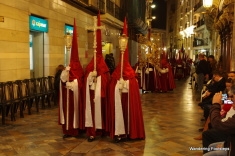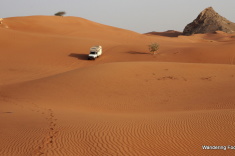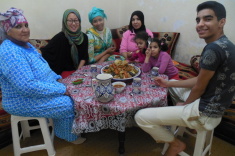Sometimes, you turn down an unknown road, just by chance, and you end up exactly where you’re meant to be.
It had been one of those days where everything goes wrong. We had driven from Kigali to Rwanda’s Nyungwe Forest National Park, with the sole goal of purchasing two one-week passes for chimpanzee tracking. We were making a huge detour south for this, but who wouldn’t for chimpanzees?
At the entrance gate, however, we learned that the prices advertised in the newest travel guides and on the internet were no longer accurate, and that we’d have to add $500 each to our total in order to track chimps for a week.
No can do, thanks.
“At least we got to see l’Hoest monkeys,” I said. It was our first time seeing these white-bearded monkeys, who are endemic to the mountainous forests of Eastern Congo, Western Rwanda, and Southwestern Uganda. We’d gotten to watch them on the side of the highway for an hour, and it hadn’t cost us a dime.
.jpg) |
| A l’Hoest monkey eating red berries from the trees. This was our first time seeing this rare, shy monkey. |
.jpg) |
| Look at him looking at us! |
Consoled, we turned to our backup plan – to camp at Banda Community Campsite, on the border of Nyungwe Forest, where apparently at this time of year, we would run a high chance of seeing chimps near the campsite.
This meant driving 15km on yet another terrible dirt road – steep, bumpy, and narrow. But who wouldn’t do this for chimpanzees?
Unfortunately, this road brought us into a valley from our nightmares. No signs for the camping, no one speaking English or French, hundreds of children staring at us, chasing the car, and trying to hitch rides on the back, and everyone who “helped” us holding out their hands for a “gift”.
Without locating the campsite, we got the hell out of there, back up those same fifteen bumpy kilometers. Our detour had cost us over three hours, and it was now mid-afternoon.
.jpg) |
| Driving down the bad 15km road to Banda Campsite. |
 |
| Arriving in Banda village, where the signs ended and no one spoke our language. |
 |
| These kids might seem harmless, but I assure you they weren’t |
The backup to our backup plan was to head to Karongi, on Lake Kivu, 150km away. It wasn’t a great backup-backup, especially since we didn’t know of a campsite there, but we’d never expected to need to turn to this half-baked option.
“At least it’s tar road,” Bruno said. All the main roads in Rwanda thus far had been smooth and fast-going. “We’ll be there in two hours.”
Well, it wasn’t, and we weren’t. There was some of the most intense construction I’ve ever seen in all of Africa. The narrow, bumpy dirt road wound around the hills, and when the builders were in the middle of moving rocks or creating terraces, there was no detour around them. We just had to wait.
When we got blocked for over an hour by a truck launching rocks onto the road from a cliff above, it was time to concede defeat. It was almost 6pm, the sun would set in an hour, we’d been driving for ten full hours and we still had almost 40km of bad road (meaning two hours) before we arrived at a town with possibly no campsite. We had never been in this situation before – Bruno being such an experienced and well-planned traveler – but there seemed nothing to do but drive on.
 |
| Construction work blocking our path for over an hour. Time to concede defeat? |
Out of nowhere, a sign appeared announcing the Ngoma Camp Site a mere kilometer up the hill. It seemed like the answer to our prayers. Naturally we turned.
Once again, however, the signs ended there, and the campsite was nowhere to be found. We must have looked despondent, for a man approached our vehicle. Strangely, he was Asian, – a rarity in small African villages – and stranger yet, he spoke perfect English.
“You are welcome to park your car at our home,” he offered, pointing not far up the road.
Bruno is fiercely independent and is unusually uncomfortable with intruding on others and disturbing their lives. To my surprise, he acquiesced, which showed how truly exhausted he was.
I’m so thankful that he acquiesced, for it allowed us to know Jesse and his wife, Amy. A Filipino couple living and working as missionaries throughout Africa for at least the past decade, they welcomed us into their home with true Asian hospitality. They offered us a hot shower, access to a toilet, a room if we wanted, and a hot meal. We kept trying to refuse, but it was impossible to turn Amy down. She was not going to let us go hungry, and she filled our freshly-washed bodies with avocadoes from their tree, home-made guava jam (also from their tree), an entire vine of bananas, and a cup of before-bed hot chocolate.
“I’m going to make you a fresh loaf of herb bread, too,” she continued, not taking no for an answer. “I have a bread machine, so I’ll just pop all the ingredients in now, and it will be ready in the morning.”
When morning came, the bread was indeed ready, cooling on the kitchen table for us, along with coffee, hot chocolate, jam, and peanut butter.
“Sit. Eat.” In the years that I’ve known Bruno, I’ve never seen him eat anything but fruit-yogurt-muesli for breakfast. But he sat, without argument, and ate delicious homemade jam on warm homemade bread.
Feeling refreshed after our long night sleep, we were finally able to converse properly with Jesse and Amy, to learn about their family back home, their work as surgeons, their upcoming travel plans, and their life in Africa. They oohed and ahhed at the inside of our camper van, and took photos galore of us at the breakfast table, outside the camper, and in the front garden.
When we departed a couple of hours later, it was as old friends. They wished us well and waved us off from the door, still snapping photos.
 |
| Posing with our Filipino hosts outside their home. |
 |
| Posing outside our home! |
This twelve-hour encounter absolutely blew me away. Despite all the positive aspects of traveling in Africa, I always carry a hidden weight on my shoulders. It’s the weight of profit and self-interest that seems to motivate most of our interactions with people. Only earlier that day, we’d been given help by Banda villagers, who then turned out their hands for a reward. I’ve unfortunately often become weary and suspicious of friendly people who engage us in conversation or offer their help, because I’m always waiting for the catch, for the business exchange to take place.
In one evening, Jesse and Amy blew away the weight that had been building up for so many months. With them, we knew we weren’t being seen as an opportunity to make a quick buck. More than that, we felt the genuine joy they seemed to take in being able to give, to share, to shower their hospitality onto us.
Jesse and Amy offered us the comfort and safety of their home, several home-cooked and home-grown delicacies, and hours of heart-warming conversation. But what they actually gave us – without even knowing it – is a faith restored in humanity and a refreshed spirit to journey onwards through the heart of Africa.
Thank you so much, Jesse and Amy, for the haven you offered in the middle of Rwanda!!


